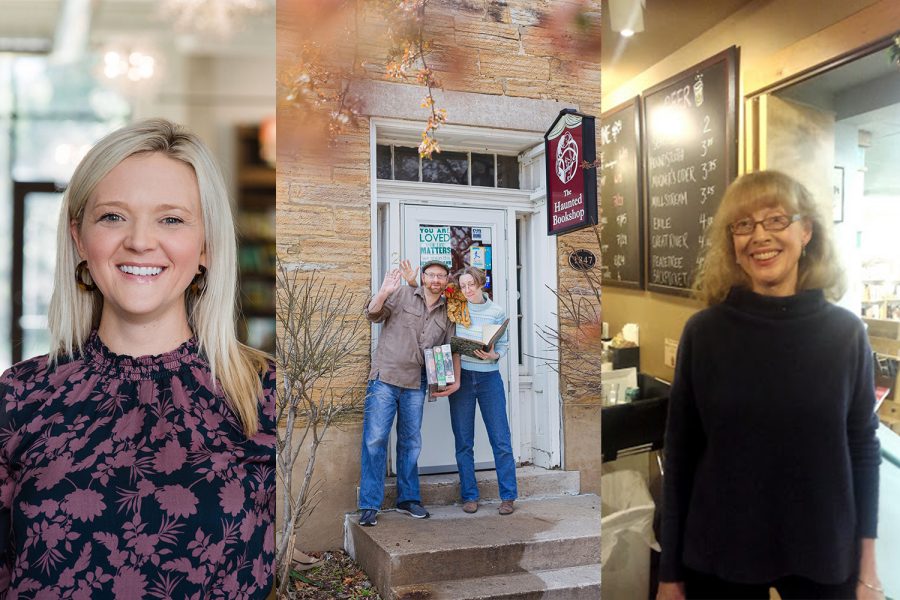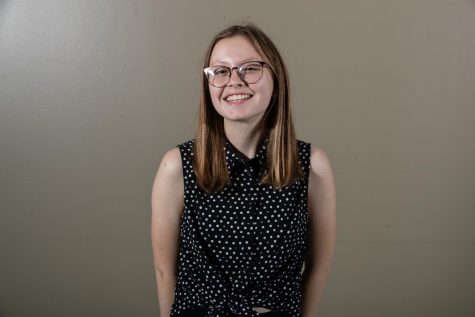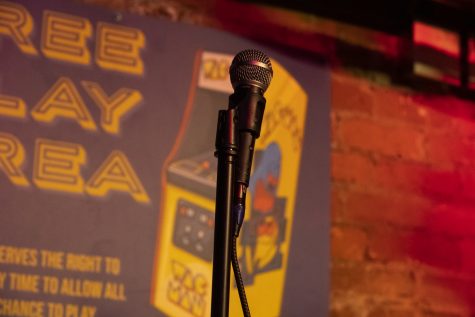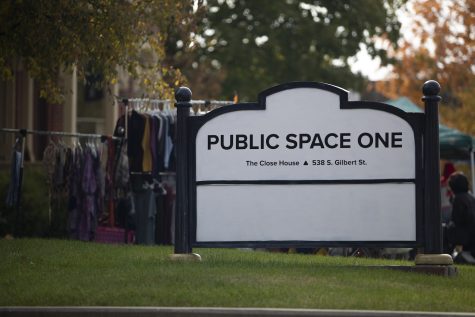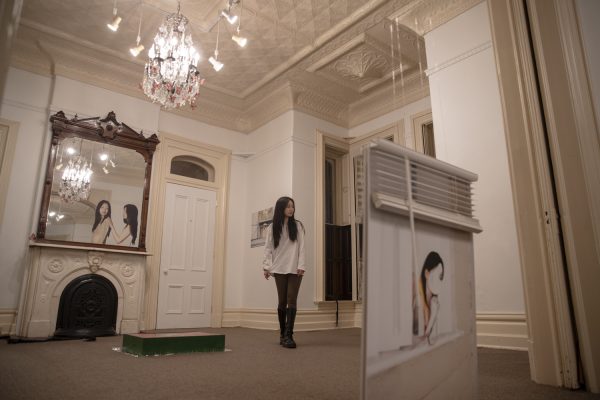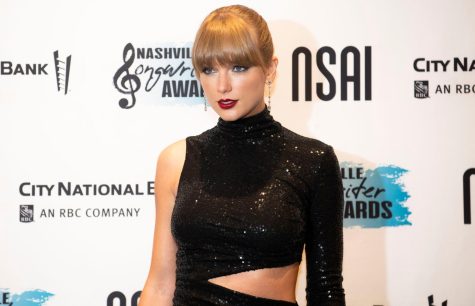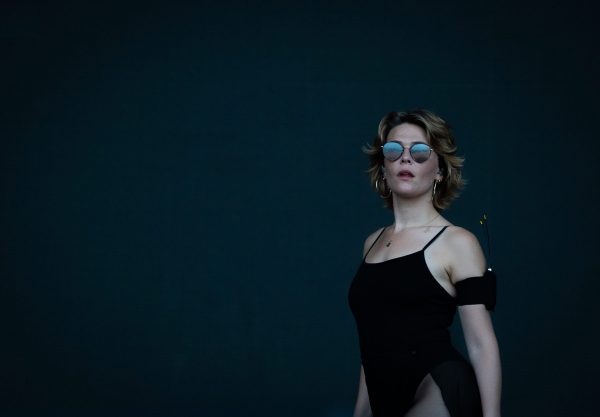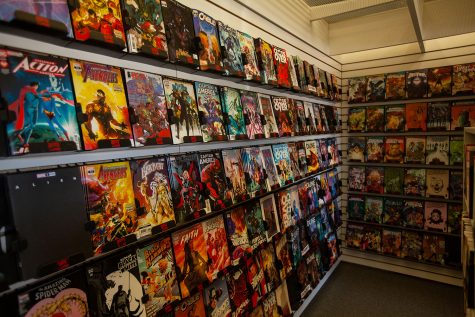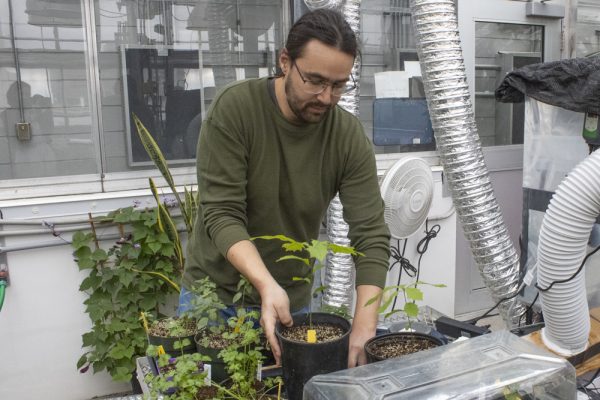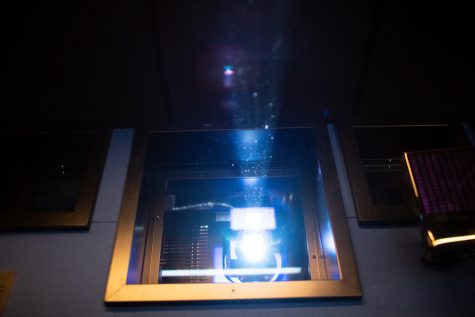Bookstores feel impact as the COVID-19 plot thickens
As the COVID-19 pandemic drags on, local book shops in Iowa City have noticed a decline in sales — and some new trends — despite new options available for customers.
From left to right, Sidekick Coffee manager Katy Herbold, The Haunted Bookshop manager Nialle Sylvan and her husband Joshua Langseth, and Prairie Lights manager Jan Weissmiller pose for a portrait. Contributed. (Sidekick Coffee photo by Rebecca Sanabria)
July 15, 2020
When walking into The Haunted Bookshop, customers and perusers are greeted by the worn, musty smell of books and the occasional feline friend curled up by a windowsill. Nothing but the gentle turn of a page or the sound of soft footsteps can be heard while sifting through endless knowledge on its shelves.
However, this experience has been lost to bookworms since March 16, when the store — well known for its rare and secondhand books — opted to conduct business on a virtual platform.
As COVID-19 continues to infect people and their livelihoods, some local Iowa City bookstore owners have changed the way they run their businesses, including Nialle Sylvan, the owner of The Haunted Bookshop.
Most of The Haunted Bookshop’s rare books, what the owners refer to as “the weird stuff,” are online, with a 6,000 rolling inventory. Sylvan and their staff have recently entered another 1,000 books to their site, which consist of fiction and African-American studies, they said.
Along with curbside pickup, local delivery, and shipping, The Haunted Bookshop started a new initiative where customers can submit a description of themselves or of a friend, including what kind of books they like, and have Sylvan — and their husband, who also works at the store —pick out a personalized book based on that description.
“People responded to this in huge numbers, it was so gratifying,” Sylvan said. “You know, one of the reasons I’m in book-dealing is because I love sharing my favorite books with people, right? We just get one of those emails and we’re like, ‘oh, oh, oh, it’s a surprise me email!’ And then we just sort of tear around the store looking for things and comparing notes about what looks like a good recommendation for this person.”
The new initiative has paid the bills, and the store is doing OK financially, Sylvan said. However, store sales have been significantly lower since the pandemic hit Johnson County. In the first half of the year, the store usually sells 2,000 books per month, and Sylvan said these numbers rise in the summer to 3,000 or 4,000 books per month.
The store sells 1,000 books a month on average right now, Sylvan said.
Sidekick Coffee and Books has also taken an economic hit during the pandemic. The store opened in September of 2019, and according to owner Katy Herbold, there is no way to compare or contrast the numbers of books sold before and after COVID-19. However, she said that sales, on average, have been cut by at least 60 percent.
RELATED: Readings, readers, and writers: A brief history of Prairie Lights
The store offers socially distanced outdoor seating on the Melrose side of the store. While customers cannot come inside and browse the bookshelves, they can sit outside and sip or snack on ice cream, pastries, and coffee. Otherwise, readers can pick up their books through contact-free pickup, Herbold said.
“I think people are reading more, I would say COVID has not helped my sales and the book department has definitely slowed down because people can’t come in and look at books and peruse,” she said. “They aren’t picking up stuff that they might not normally otherwise read.”
Outside of books, Herbold has noticed how popular the purchase of jigsaw puzzles is with her customers. She’s even started stocking up on fall and winter-themed puzzles because of their popularity. Even Sylvan started selling puzzles, though shipping them is costly because media mail requires the object to be “bound, printed matter.”
“Puzzles, because they’re not part of that group, has to go by regular parcel posts, and parcel post rates are much higher,” Sylvan said.
Since COVID-19, Prairie Lights has also been selling fewer books than they normally would co-owner Jan Weissmiller said. Weissmiller declined to give a number regarding sales both pre- and post-pandemic, but she said that the store is still selling books every day to people spanning across all ages, and believes that people are reading more while staying indoors. Prairie Lights has also been hosting virtual events through the pandemic.
“We are seeing a huge interest in books,” she said in an email to The Daily Iowan. “We have sold quite a few books that do deal with pandemics — particularly The Decameron by Boccaccio which is set in the countryside outside of Florence Italy during the Black Death in the 14th Century… And, since the death of George Floyd on May 25th we have seen an unprecedented interest on books about the history and future of race relations in America. There are so very many titles that we’ve been selling concerning this that it would be hard to recount them all.”
A virtual book club, called “100 Days of Decameron” was launched on April 1 by the Iowa City City of Literature to encourage people to continue reading. Assistant Adjunct Professor Anna Barker led the club where they read Giovanni Boccaccio’s novel, The Decameron.
Prairie Lights would have been able to sell books during the Mission Creek Festival — which was canceled due to COVID-19 — to students for the remainder of the semester, and at their readings, which can sometimes bring in over 100 people, Weissmiller said.
They also would have been able to sell books over the summer at the Iowa Summer Writing Festival. Sylvan, owner of The Haunted Bookshop, shared a similar sentiment regarding UI students, because the demographic makes up a large part of their clientele.
“Everything depends on the response of political and university leadership,” Sylvan said. “Right now, the university doesn’t really have a good, solid plan for how to protect students. Students are part of our biggest clientele. This has all been really hard, but we are working very hard to find ways to put everybody else in a safe spot.”



